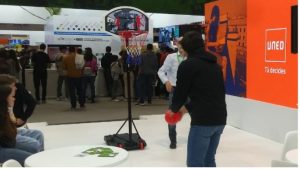HUManAID-Sens: HUMan-centered Assisted Intelligent Dynamic systems with SENSing technologies

Motivation
Previous research has proven the impact that the human factor has on intelligent environments, where there is a challenging gap between what is provided by an intelligent system and what is really needed to support both full autonomous functioning within the given context and better catering for the user needs. However, despite the clear benefits, personalized systems are still scarce in real–world applications, mainly because of the level of difficulty associated with providing this type of support.
Project target
In HUManAID project, we try to fill this gap by building a framework that supports the development of adaptive systems, adopting a user–centered design. To this end, we gather the wide expertise of the 4 subgroups that conform the project in different application areas, to bring it together under the construction of a Digital and Ecological Transition based on Automation (DETA) framework that facilitates the development of systems that behave according to the evolving needs of users and their traits. To tackle this gap and progress on the level of autonomy and performance of these intelligent systems, this project focuses on developing a common ground of digital user–centric intelligent technologies that combine inter–subject and intra–subject approaches within highly sensed scenarios that consider ecological needs. The purpose here is to understand and detect user and system needs in an innovative collaborative way user–system/system–user using the minimum electronic and computational resources so that the user increases his/her performance and satisfaction along with the system, which in turn increases its level of autonomous functioning and adequacy to cater for the user and the context changing needs within the given situation.
In this way, through the proposed DETA framework, the project covers several key issues related to the digital and ecological transition:
- Go beyond ad–hoc personalization in domain independent interactive systems so both users’ performance and trust are improved;
- Carefully define how to develop the sensing and acting infrastructure so that ecological considerations, related to low intrusiveness approaches, are taken into account and thus make the systems really applicable in real world environments;
- Address the gap between building general models, that cannot support personalization, and individual models that are not able to generalize, using semi–supervised learning techniques, which also contribute to produce digital solutions that are ready to be used in the real world, and not just in the laboratory, as typically happens with adaptive systems;
- Develop procedures and tools that ensures fairness, accountability, transparency, gender considerations and inclusion supporting privacy and ethical standards throughout project developments and dissemination activities.
RESEARCHERS
Olga C. Santos
Lead Researcher
Jesús G. Boticario
Lead Researcher
Raúl Cabestrero
Researcher
Pilar Quirós Expósito
Researcher
Antonio Rodríguez Anaya
Researcher
Angeles Manjarrés
Researcher
Raquel Horta Bartomeu
Researcher
Jose María Alcaraz Calero
Researcher
Jon Echeverria San Millán
Researcher
Alberto Casas Ortíz
Researcher
David Puertas Ramírez
Researcher
Miguel Portaz
Researcher
LATEST NEWS:
Inteligencia Artificial y Baloncesto: cómo la Tecnología puede ayudar a mejorar tu tiro libre
El pasado 24 de marzo de 2023 con motivo de...
Read MoreHumanAID project starts
Today we have had the kick-off meeting of HUManAID (HUMan-centered...
Read MorePUBLICATIONS:
- Portaz, M. & Corbi, A. & Casas-Ortiz. A. & Santos, O.C., Exploring raw data transformations on inertial sensor data to model user expertise when learning psychomotor skills, in the User Modeling and User-Adapted Interaction, 2024. https://doi.org/10.1007/s11257-024-09393-2
- Portaz, M., Manjarés, A., Santos, O.C.: Towards human-centric psychomotor recommender systems. UMAP ’23 Adjunct: Adjunct Proceedings of the 31st ACM Conference on User Modeling, Adaptation and Personalization (UMAP ’23 Adjunct), Limassol, Cyprus, 6 (2023). https://dl.acm.org/doi/10.1145/3563359.3596993
- Labra, C., Santos, O.C.: Exploring cognitive models to augment explainability in Deep Knowledge Tracing. UMAP’23 Adjunct: Adjunct Proceedings of the 31st ACM Conference on User Modeling, Adaptation and Personalization, Limassol, Cyprus, June 2023 https://doi.org/10.1145/3563359.3597384
- Santos, O.C., Portaz, M., Casas-Ortiz, A., Echeverria, J., Perez-Villegas, L.F. (2023) Designing, Building and Evaluating Intelligent Psychomotor AIED Systems (IPAIEDS@AIED2023). 24th International Conference on Artificial Intelligence in Education (AIED 2023). Adjunct Proceedings. N. Wang et al. (Eds.): AIED 2023, CCIS 1831, pp. 1–6, 2023. https://doi.org/10.1007/978-3-031-36336-8_14
- Echeverria, J. and Santos, O.C. (2023) Towards Analyzing Psychomotor Group Activity for Collaborative Teaching Using Neural Networks. 24th International Conference on Artificial Intelligence in Education (AIED 2023). Adjunct Proceedings. N. Wang et al. (Eds.): AIED 2023, CCIS 1831, pp. 1–6, 2023. https://doi.org/10.1007/978-3-031-36336-8_63
- Santos, O.C.: 24th International Conference on Artificial Intelligence in Education, AIED 2023, Tokyo, Japan. General Co Chair https://www.aied2023.org/organizing_committee.html
- Portaz, M.: 24th International Conference on Artificial Intelligence in Education, AIED 2023, Tokyo, Japan. Publicity Co Chair https://www.aied2023.org/organizing_committee.html


